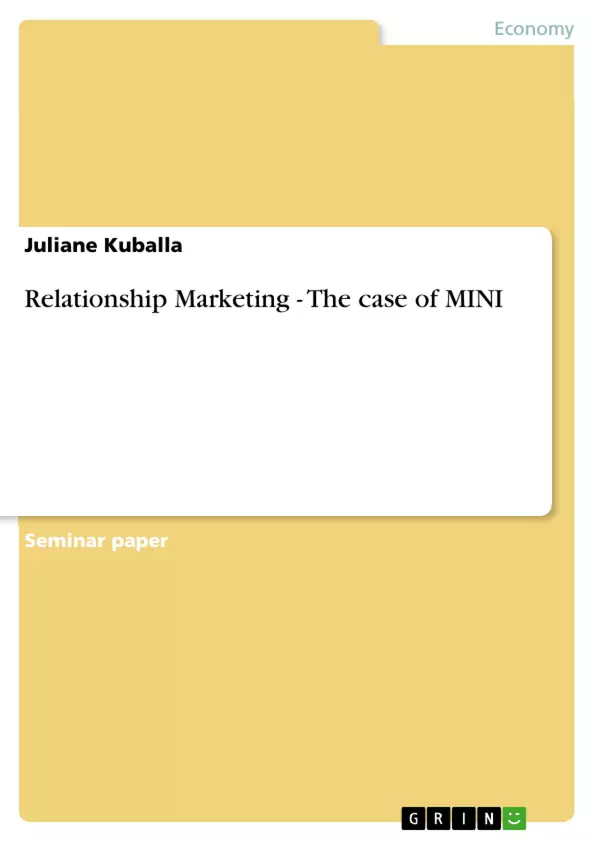This academic paper critically analyses the relationship marketing orientation of MINI, a cult car of the car manufacturer BMW. A brief historical review serves to demonstrate MINI’s specific position in the BMW brand portfolio. Further, the need to build a close relationship especially with retailers and end-consumers is demonstrated. In this context the expanded marketing mix framework is applied to state the relationship marketing activities MINI currently adopts. Further suggestions for improvement are provided accordingly. Finally shortcomings of relationship marketing knowledge as well as appropriate recommendations are provided.
Inhaltsverzeichnis (Table of Contents)
- The remarkable significance of relationship marketing for the automotive industry
- MINI
- Relationship marketing orientation of MINI
- Product
- Price
- Promotion
- Internet
- Co-operations
- MINI International magazine
- Guerrilla marketing actions
- People
- Place
- Processes
- Automation
- Individual offer proposal and customer support
- Complaint management
- Shortcomings of existing relationship marketing theory
- Conclusion
Zielsetzung und Themenschwerpunkte (Objectives and Key Themes)
This paper aims to critically analyze the relationship marketing orientation of MINI, a cult car of the car manufacturer BMW. It seeks to demonstrate the need for a close relationship with both retailers and end-consumers. It applies the expanded marketing mix framework to identify relationship marketing activities implemented by MINI and provides suggestions for improvement. Finally, it addresses shortcomings of existing relationship marketing theory and offers relevant recommendations.
- The importance of relationship marketing in the automotive industry
- The relationship marketing orientation of MINI
- The expanded marketing mix framework as applied to MINI
- Shortcomings of existing relationship marketing theory
- Recommendations for improving relationship marketing activities for MINI
Zusammenfassung der Kapitel (Chapter Summaries)
- The remarkable significance of relationship marketing for the automotive industry: This chapter explores the evolution of the automotive industry from a seller's market to a buyer's market and the importance of relationship marketing in this context. It highlights the need for customer satisfaction and building long-term relationships to gain loyalty.
- MINI: This chapter provides a brief historical overview of MINI's position within the BMW brand portfolio, showcasing its growth and appeal as a cult car across various demographics. It also discusses the significance of MINI's unique position in the small-size car segment.
- Relationship marketing orientation of MINI: This chapter defines relationship marketing and distinguishes it from transactional marketing. It emphasizes the complexity of the car buying decision process and the importance of a relationship marketing approach for high-involvement goods. It further identifies the key groups MINI needs to build relationships with - retailers and end-consumers.
- Relationship marketing activities implemented for the MINI: This chapter introduces the expanded marketing mix framework developed by Christopher, Payne, and Ballantyne, which provides a broader perspective on building relationships beyond traditional marketing approaches. It then explores specific examples of relationship marketing activities implemented by MINI across different marketing mix elements.
Schlüsselwörter (Keywords)
This paper explores the concept of relationship marketing, particularly within the context of the automotive industry, using MINI as a case study. Key themes include relationship marketing orientation, the expanded marketing mix framework, customer loyalty, and brand appeal. The paper also addresses shortcomings of existing relationship marketing theory and offers recommendations for improvement.
Frequently Asked Questions
What is relationship marketing in the automotive context?
It is a strategy focused on building long-term loyalty with customers and retailers rather than just individual sales transactions.
How does MINI position itself within the BMW portfolio?
MINI is positioned as a "cult car" that appeals to diverse demographics through its unique brand identity and lifestyle focus.
What is the "expanded marketing mix"?
Beyond the traditional 4 Ps, it includes People, Processes, and Place (customer contact points) to better analyze service and relationship quality.
What are some examples of MINI's guerrilla marketing?
The paper discusses creative, unconventional actions and the "MINI International" magazine as tools to strengthen the brand community.
Why is complaint management important for MINI?
Effective complaint management is a key process to turn negative experiences into positive relationships and maintain high customer involvement.
- Quote paper
- Juliane Kuballa (Author), 2006, Relationship Marketing - The case of MINI, Munich, GRIN Verlag, https://www.grin.com/document/66937



